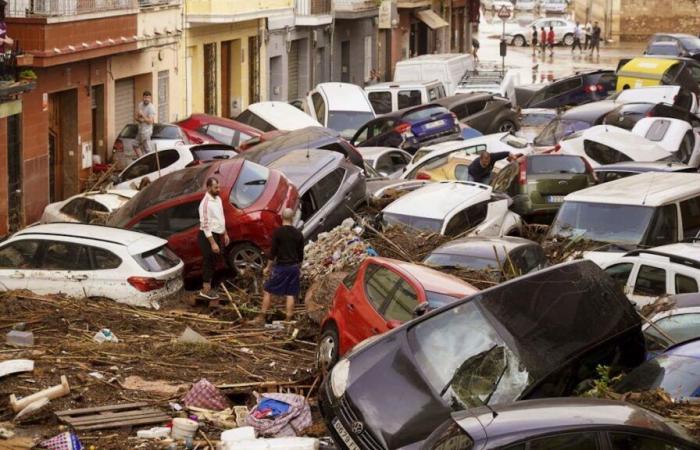End of the red alert for bad weather in Spain, very hard hit by bad weather in recent weeks. (Archive image)
AFP
The Spanish Meteorological Agency on Thursday lifted its red alert for bad weather in the south and east of Spain, at the end of a night marked by heavy precipitation, for which the authorities have not reported at this stage of new victims.
“The worst of this second depression is over,” indicated on the social network tragic floods causing at least 223 deaths.
The public agency had placed these two regions on red alert on Wednesday evening, the maximum possible level, in a region with an “extreme” risk of flooding linked to the presence of a new “cold drop”, an isolated depression at high altitude quite common in autumn on the Spanish Mediterranean coast.
This alert was initially supposed to remain in effect until 12 p.m. for the coastline of the Valencia region, and 8 a.m. for the province of Malaga. “Avoid travel. “River overflows and flooding may occur,” she warned.
This alert, issued just two weeks after the deadly floods that hit the south-east of the country, had revived the fears of residents, particularly in the affected communities, where around fifteen people are still missing and where clearance work is continuing. continue.
Prevention is better than cure
In the Valencia region, this situation pushed the authorities to issue traffic restrictions and suspend classes on Thursday in more than a hundred municipalities. Rail traffic between Barcelona and Valencia has been suspended, while the resumption of trains on the Madrid-Valencia line, scheduled for Thursday morning, has been postponed.
Only travel for “force majeure” is authorized, announced Wednesday evening the conservative president of the Valencia region Carlos Mazón, widely criticized for his lack of responsiveness and his chaotic management of the floods at the end of October.
In Malaga, where several roads were flooded and air traffic was severely disrupted, the metro was closed and the train line to Madrid was suspended. More than 4,200 people were also “preventatively” evacuated, according to the authorities.
“Prevention is better than cure, we saw it in Valencia,” explained the president of the Andalusia region, Juan Manuel Moreno, during a trip to Seville.
According to Aemet, torrential rains did indeed fall overnight in the regions concerned, with accumulations of 110 liters of water per square meter (110 millimeters) in Alcudia de Veo, in the hinterland of Valencia. , AND 88 liters (88 mm) in Chiva, a village already hit by the floods at the end of October.
These rains forced emergency services to carry out new rescue operations, both in Andalusia and in the Valencia region. But no new victims had been reported by authorities as of Thursday morning. “At this time, there are no victims in Andalusia,” Mr. Moreno declared on RTVE.
Makeshift barricades
Faced with fears of new floods, residents had set up makeshift barricades with bags of earth on Wednesday morning in front of the doors of houses in Paiporta, a town in the suburbs of Valencia considered to be the epicenter of the October 29 disaster.
The authorities were particularly afraid of seeing the sewers still blocked by the tons of mud and rubbish which accumulated in the affected communities at the end of October overflow, which the authorities have not yet been able to completely evacuate.
The Valencia authorities were strongly criticized for their management of bad weather on October 29. This indignation gave rise to massive demonstrations on Saturday, the largest of which brought together 130,000 people in Valencia.
(afp)






